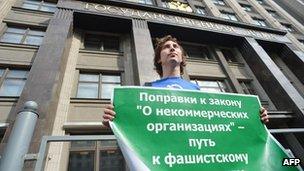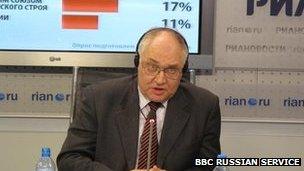Russia Levada Centre pollsters targeted as 'foreign agents'
- Published

Some critics of the law say it is a step towards fascism
The head of Russia's only independent polling agency, Levada Centre, has said it could be forced to close after a warning from officials that it had to obey a controversial new law.
Prosecutors said the centre had to register as a "foreign agent" because it was involved in political activity and received foreign funding.
Levada Centre is one of a string of NGOs to be investigated recently.
Critics say the law is meant to tarnish the image of civil society groups.
The BBC's Steve Rosenberg in Moscow says that despite pressure, Russia's most prominent human rights and civil society groups have all refused to register as foreign agents.
In a statement, Levada Centre head Lev Gudkov said prosecutors had not only threatened the organisation with sanctions but had undermined its authority.
"The warning puts the Yuri Levada Analytical Centre in an extremely difficult position, in effect forcing it to cease its activity as an independent sociological research organisation, carrying out systematic polls of public opinion in Russia," the statement said.

Levada Centre head Lev Gudkov said only a fraction of the centre's budget came from overseas
Mr Gudkov added that foreign funding amounted to only 1.5-3% of the centre's budget each year.
The law requires the phrase "foreign agents" to be included in all materials produced by all affected NGOs. They would also have to undergo financial audits and issue twice-yearly reports on their activities.
The Russian authorities say the law is needed to protect Russia from outside attempts to influence internal politics.
But critics say it could be used to prevent NGOs denouncing vote-rigging and other abuses.
The term "foreign agent" carries a Soviet-era negative taint in Russia, suggesting spying, correspondents say.
Failure to comply with the legislation is punishable by heavy fines or even a two-year prison sentence.
Last month the election watchdog NGO Golos became the first organisation to be fined under the new law.
Last September, USAID was expelled from Russia after being accused of attempting to "influence political processes through its grants", which had totalled $3bn (£2bn).
- Published25 April 2013
- Published21 July 2012
- Published19 September 2012
- Published8 April 2013
- Published27 March 2013